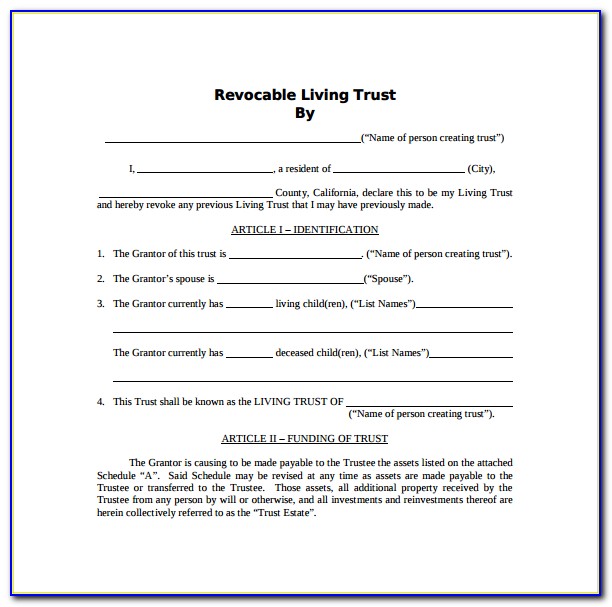Having lots of beneficiaries or not sure of them can complicate things especially when you want to distribute your properties to them. However, that is why you need a revocable trust which will allow a grantor to be able to change or amend the trust at his/her discretion. Nevertheless, this article will anchor on what is a revocable trust vs irrevocable trust. Also, we will discuss the difference between revocable trust vs will, revocable trust taxes, and form. Not forgetting what are their benefits and disadvantages.

You made the right choice by clicking on this article. Keep reading to see what will have in stock for you in details.
What Is Revocable Trust?
A revocable trust is a trust that gives room for alteration or cancelation dependent on the grantor or the originator of the trust. However, during the life of the trust, income earned is given to the grantor. Furthermore, only after death does property transfer to the beneficiaries of the trust.
In most cases, the grantor maintains several rights over the trust during his or her lifetime. These usually include the right to direct the trustee to distribute all or any portion of the trust property, as the grantor desires, and the right to change or revoke the trust at any time.
Nevertheless, this is helpful since it offers flexibility and income to the living grantor. However, you can modify the terms of the trust and upon the trustor’s death, the beneficiaries will receive the estate.
Therefore, when a grantor dies, the trust acts as a will, and the trust agreement state that the beneficiary should receive the property upon the grantor’s death. While a trust may be funded upon the grantor’s death, it is usually better to fund it while the grantor is alive. Hence, it ensures continuity of asset management and financial support of the grantor, should he or she become disabled.
If a trust is revocable, does it mean that there can be an irrevocable trust? The answer to that question is yes. Now let us discuss the difference between irrevocable vs revocable trust.
Irrevocable vs Revocable trust
Indeed, both are different in several ways. Let’s discuss some of these differences.
An irrevocable trust defines a trust that cannot be altered after it is formed without the approval of the beneficiaries. However, the grantor may modify its terms at any time. They can switch beneficiaries, and adjust conditions as to how assets within the trust are managed.
Again, because the owner holds such a level of power over a revocable trust, the assets they put into it are not protected from creditors. However, it is not the same for an irrevocable trust.
Also, in a revocable trust, if they are sued, the assets can be required liquidated to satisfy any resolution put forth. However, when the grantor dies, the assets held in the trust are also subject to both state and federal estate taxes. While irrevocable trusts offer tax-shelter privileges that revocable trusts do not have.
Which Is Better: A Revocable or Irrevocable Trust?
Each type of trust is best for its intended use. Revocable trusts are best for estate planning with a will because the trustor retains control over the assets. Once created, an irrevocable trust becomes a legal entity that owns the assets inside. Because the trustor no longer controls those assets, there are tax advantages and creditor protections. Transferring high-value assets that may cause gift or estate tax issues is best with these.
What Is a Revocable Living Trust?
It is possible to make a living trust either revocable or irrevocable during the trustor’s lifetime. A revocable living trust is a common estate planning tool used to keep assets out of probate court and family feuds. The revocable living trust does not provide any legal protection from taxes or creditors, unlike the irrevocable trust.
Revocable Trust Vs Will
So many times when newbies confuse these two, we tend to forgive them because they are talking about the same thing. However, there still have some differences.
Generally, Wills vs revocable trusts are both property planning instruments that help ensure you secure your assets and transfer to your heirs, besides your spouse, which is usually not an issue.
However, a will is a written document stating a deceased person’s wishes. This wish can range from naming custodians of minor children to give cash assets to friends, families, or charities.
A will becomes active only after the owner dies. However, a revocable trust becomes active the day you create it. In a will, the grantor cannot list the distribution of the property to anyone until the owner dies. While in a revocable trust, a grantor may list the division of assets before their death in it.
Revocable Trust taxes
Revocable trusts are the easiest of all trust forms from an income tax viewpoint. Any income created by a revocable trust is taxable to the trust’s creator or grantor during the trust creator’s lifetime. This is because the grantor holds full control over the terms of the trust and the assets included in it.
Generally, during the grantor’s lifetime, the taxpayer identification number of the trust will be the grantor’s Social Security number. However, all items of income and credit will be recorded on the grantor’s income tax return. Hence no return will be for the trust itself.
Furthermore, they are “grantor” trusts for income tax purposes. One could think of them as being hidden to the IRS and state taxing authorities.
Revocable Trust Form
The use of a revocable trust form is to describe the features of trust. However, a revocable trust form should involve all specific details of your assets. Nevertheless, here are lists of assets required in a revocable trust form.

- Personal property( This includes furnishings, automobiles, jewelry), etc.
- Business interests
- Cash/bank accounts
- Certificates of Deposit (CDs)
- Real estate
- Brokerage accounts and stocks (such as any stock holdings or retirement accounts).
What Are The benefits of Revocable Trust?
There are several benefits of establishing a revocable trust. Here are some of them.
#1. Flexibility
They allow the grantor to make changes at his/her discretion. That can prove priceless if the situation of the grantor changes. Also, it can be helpful if the grantor just isn’t sure of who he/she wants to name as their beneficiaries. However, this flexibility also makes these trusts a popular choice for newbies planning their estate.
#2. Avoidance Of Court Involvements
If a beneficiary is not of legal age the minor’s assets are kept in the trust rather than having the court designate a guardian. However, if the grantor believes a beneficiary will not use the assets wisely, the trust allows a certain amount of money to be distributed regularly.
#3. Assets are Available at Grantor’s Death
Assets at the grantor’s death are ready and available to raise cash to pay estate taxes, administration expenses, and debts immediately after death. Hence, there will be no need to wait for a probate order or the issuance of preliminary letters.
However, if the trust is funded before death, the property in the trust remains in the trustee’s name before and after the death. Hence, readily available for liquidation should the need arise.
What Are The Disadvantage Of A Revocable Trust?
There are a few disadvantages of a revocable trust. Let’s take a look at some of them.
1. Costs Time
Implementing a revocable trust requires much time and effort. Assets must be reregistered in the name of the trust. Indeed, this may be stressful and may involve other costs such as filing fees. The grantor’s entire estate plan must be monitored annually to ensure the trust’s objectives are being met.
2. No Tax Advantage
A revocable trust does not allow the grantor tax protection. Indeed, not all assets will be added to the revocable trust. Therefore the grantor must create a will to select beneficiaries for the remaining assets, to avoid probate. Also, during the grantor’s lifetime, the grantor’s properties are not protected from creditors.
#3. Conclusion
In conclusion, this is helpful since it offers flexibility and income to the grantor. However, you can modify the terms of the trust and upon the Grantor’s death, the beneficiaries will receive the estate. Nevertheless, Irrevocable vs Revocable trust are all part a living trust.
What is the purpose of a revocable trust?
Nevertheless, this is helpful since it offers flexibility and income to the living grantor. However, you can modify the terms of the trust and upon the trustor’s death, the beneficiaries will receive the estate.
What are the disadvantages of a revocable trust?
There are a few disadvantages of a revocable trust. Let’s take a look at some of them.
- 1. Costs Time
- 2. No Tax Advantage
- #3. Conclusion






